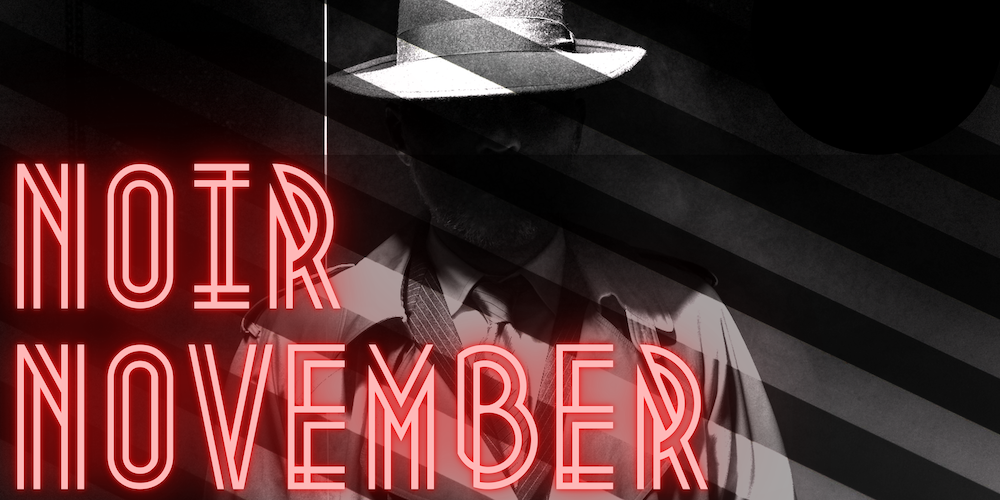Noir November: Double Indemnity
Written by Cameron Geiser
Every day for the month of November, Cameron Geiser is reviewing a noir film (classic or neo) for Noir November. Today covers Billy Wilder’s pivotal Double Indemnity.
When I think of the Noir genre of films, my mind’s eye conjures this film first. A murky world of shadows where no one is truly good, just shades of gray. Smoke filled rooms with light piercing those thick slat venetian blinds. A man emerges from the shadows with a gun in hand, while an equally dangerous and scantily clad blonde lays across furniture that’s more expensive than your whole house (if you’re so lucky). Billy Wilder’s third film, not counting Bad Seed in which he was a co-director, is a knockout of the genre.
The plot, or the actual ongoings of the film, are typical of what you might expect of a Noir. But it’s everything surrounding the plot that pushes this film to the heights of the Noir genre. Quick-witted dialogue (Raymond Chandler assisted with most of the dialogue), voiceover narration from the lead character, a proper femme fatale in the form of Phyllis Dietrichson (Barbara Stanwyck), and a malleable male lead in insurance salesman Walter Neff (Fred MacMurray). Instantly there’s a crackle between the two when Walter turns up at Phyllis' house to renew her husband’s insurance policy. There’s some playful flirting before Phyllis asks Walter if it were possible to set up an accident insurance policy without her husband knowing. This prompts a quick backpedal from Walter until later when she arrives at his place, he’d left his hat in a hurry. After things escalate in the intimacy department Phyllis tells Walter her plan. There’s a double indemnity clause in the policy where the payout will double for an accidental death due to rare circumstances. After Walter agrees to the idea, they enact their plan to kill her husband on his way to a college reunion. Simple enough. When Phyllis and her husband arrive at the train station Walter strangles him and boards the train in his place. Walter eventually makes his way to the back of the train, ostensibly to smoke, but jumps off the back at the pre-planned spot to meet Phyllis and drag Mr. Dietrichson's body onto the tracks.
Fred MacMurray in Double Indemnity.
The perfect crime! At least that’s what Walter and Phyllis think, but we know that it has to all go wrong as the film opens with Walter, obviously shot and bleeding, making his way to a recording device where he begins his narration. The whole film Walter is talking directly to his boss, Barton Keyes (Edward G. Robinson), a man whose instincts tell him that something is off about Mr. Dietrichson’s death. In fact Keyes’ insistence on listening to his gut, “The little man” turning his stomach upside down with instinctual awareness, provides some of the best tension in the film. This is perhaps best demonstrated in a later scene when Keyes appears at Walter’s door one evening to work through his evolving theory about Mr. Dietrichson’s supposedly accidental death all while Phyllis is on her way to Walter’s apartment herself, a very incriminating visit! I’m not going to divulge every story detail here, just in case anyone still hasn’t seen this one. Though, I did a little digging on the production of the film, and I loved how both Wilder and cinematographer John F. Seitz collaborated to achieve that distinctive look in the film that's reminiscent of German Expressionism with the dramatic lighting and shadows as black as night. Wilder would also often wander on set and dirty it up before shoots to give everything a more “lived-in” atmosphere, the attention to detail reminded me of David Lynch's tendencies to similarly adorn sets with specific quirks that might not even translate on screen. Crafting a world down to the smallest of details has always been an impressive trait among auteur film directors, and one that bleeds from a wellspring of passion.
This is one of those films that should not be missed. Not only for its value in relation to cinematic history, but also because it's really damn good and entertaining to this day. The pacing, writing, direction, cinematography, everything comes together to forge a dreamlike Noir film that's one of the finest of its genre. Seek this one out!
Cameron Geiser is an avid consumer of films and books about filmmakers. He'll watch any film at least once, and can usually be spotted at the annual Traverse City Film Festival in Northern Michigan. He also writes about film over at www.spacecortezwrites.com.






